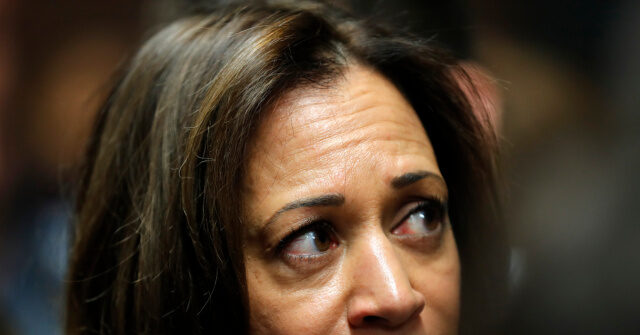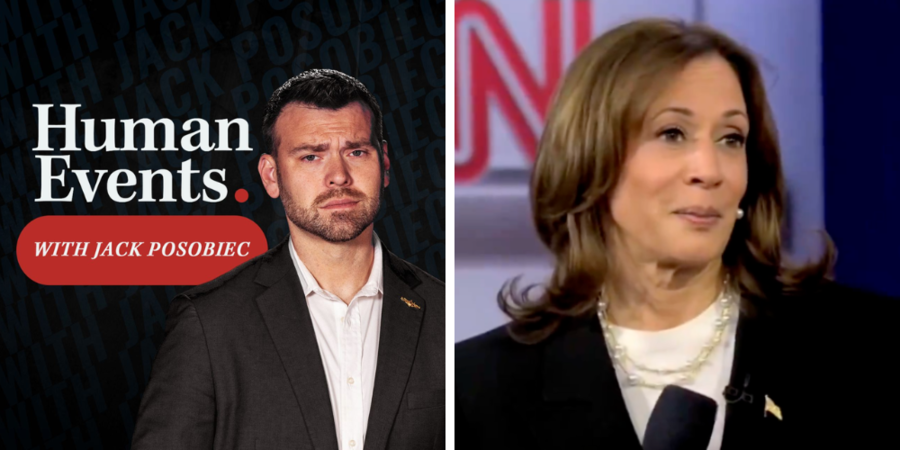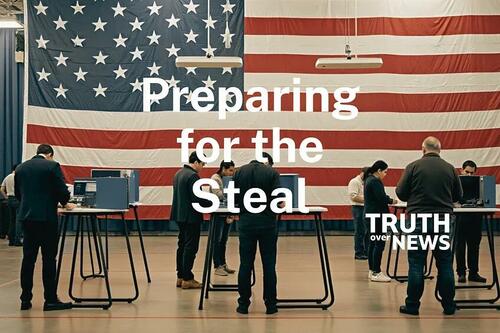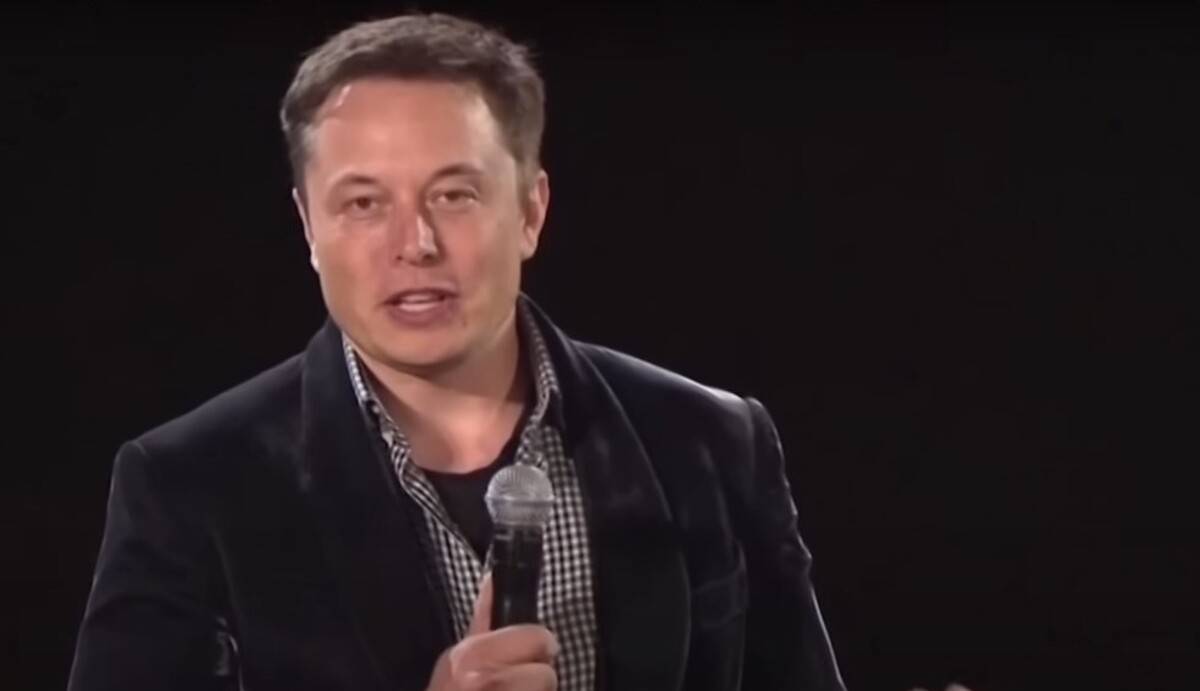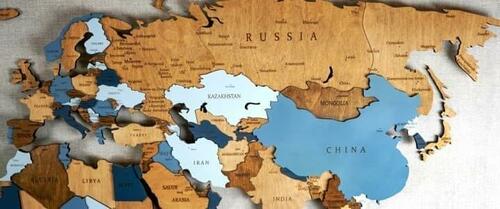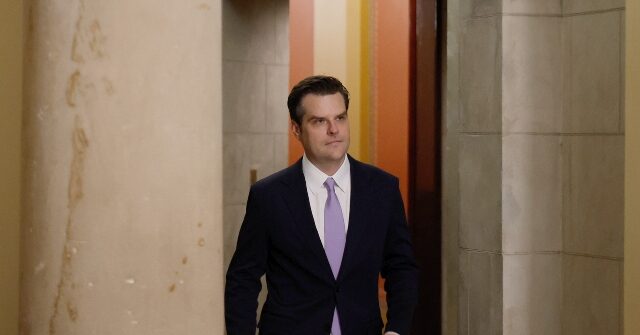Washington Post Snubs Kamala Harris with Non-Endorsement
The Washington Post will not endorse Vice President Kamala Harris for president, according to the paper’s editorial board on Friday.
The post Washington Post Snubs Kamala Harris with Non-Endorsement appeared first on Breitbart.
JACK POSOBIEC: ‘The Kamala-mentum has come to a screeching halt’
“The joy is over.”
It’s Good to Be Skeptical of Elections
As with any other government-controlled institution, a high level of public skepticism about elections is healthy.
The Political Theology That Maintains State Power
While it is tempting to think of state power as being maintained by sheer force, it still needs a “theological” justification, be it secular or religious. The US state is no exception.
NewsWare’s Trade Talk: Friday, October 25 | NewsWare‘s Trade Talk
S&P Futures are positive this morning as markets remained focused on corporate earnings and Treasury yields. Shares of DECK, LHX, DLR, COF & WDC are higher after earnings releases. U.S. Judge blocks the pending merger between Tapestry & Capri. MSFT to release hot selling video game “call of Duty today on a subscription basis. Durable Goods report is due out this morning – next week’s economic calendar is very active. In Europe, markets are mixed to lower on the back of positive earnings reports. Oil prices are higher with Middle East developments in focus.
Preparing For The Steal
Preparing For The Steal
Authored by Jeff Carlson & Hans Mahncke via Truth Over News,
Georgia, the site of massive election misinformation, questionable results, incomplete audits and a mysterious come-from-behind razor-thin win by Joe Biden in 2020, appears to be at it again. Or perhaps we should say Georgia Secretary of State Brad Raffensperger is at it again.
Kylie Jane Kremer brought the matter to our attention through a series of posts on X. As Kremer notes, “Raffensperger sent an email, in a private capacity, that went to a list of trial lawyers across Georgia soliciting $5 million by November 1st to help in his effort for a 501(c)4 called “Election Defense Fund”, asking lawyers to donate or contact him via his private gmail account & personal cell phone number.”
In the email, Raffensperger claimed that “Election deniers and conspiracy theorists have taken their anger to new levels, employing a variety of tactics including intimidation, legal challenges, and rule changes. In Georgia they have threatened, harassed, and sued election officials. And as you know, most recently the Georgia State Election Board was taken over by three individuals who have pledged to put partisanship over sworn duty.”
Raffensperger appears to be referring to (and trying to intimidate) the three Republican members of Georgia’s five -person State Election Board, Dr. Janice Johnston, Rick Jeffares and Janelle King.
Raffensperger also appears to be attempting to intimidate and silence anyone who might challenge the outcome of Georgia’s 2024 presidential election.
On September 20th, Johnston, Jeffares and King voted in favor of requiring a hand count of all ballots to ensure that the number of physical ballots equaled the machine count total at the precinct level. This new rule was opposed by Georgia state elections officials, including Raffensperger, who said it could create chaos and confusion on Election Day.
In advance of the vote by the State Election Board, Raffensperger issued a formal statement, claiming that “Activists seeking to impose last-minute changes in election procedures outside of the legislative process undermine voter confidence and burden election workers… misguided attempts by the State Election Board will delay election results and undermine chain of custody safeguards. Georgia voters reject this 11th hour chaos, and so should the unelected members of the State Election Board.”
If you find it odd that Raffensperger would refer to his three fellow Republicans as “activists” while he worked to thwart common-sense changes that would dramatically increase the security of Georgia’s 2024 election, you’re not alone.
Raffensperger was apparently so concerned that he rushed to CNN-affiliate WSB, breathlessly claiming that “the State Election Board wants to take us back in time. I guess what they want is to see elections take until 3 a.m. like in Detroit, Michigan. We don’t want to do that in Georgia. Not on my watch.”
Although the move by the three Georgia Republicans had the support of President Trump, lawsuits were immediately filed – and on October 16th a Georgia court blocked the rule changes, inexplicably declaring that they were “illegal, unconstitutional and void.”
We don’t have a copy of the email (Kremer doesn’t have the full email either) but Georgia’s GOP Chairman Josh McKoon appeared to confirm the email was real in a post on X.
McKoon stated that “This email communication by Mr. Raffensperger is a dangerous and unwarranted attack on sworn elections officials doing their duty which threatens to interfere in the conduct of the election and undermine confidence in the outcome.”
McKoon went on to write that Raffensperger “spitefully harasses and undermines the public servants who have stepped up to do the job that he so spectacularly failed to do in 2020 and solicits $5 million for a secret, dark money fund “not subject to public disclosure” to dox and threaten election officials.”
As we mentioned earlier, Kremer included screenshots of the email in her post. In those screenshots was a snapshot of the address of the website, Elections Defense Fund, that Raffensperger purportedly established for the purposes of raising donations.
We looked the Elections Defense Fund up and found the site to be sparse but the language matches what is said in the email:
“Election Defense Fund, Inc. is a 501(c) (4) dedicated to protecting this year’s election results, and standing up against those who attempt to delay certification.”
“Election Defense Fund, Inc will identify local election officials who are most likely to not certify or otherwise attempt to interfere with results; educate the public to remind election officials of their duty to follow the law and the potential consequences of not doing so; support lawsuits that seek to force election officials to uphold their legal duties, and defend election officials who are harassed, targeted, or sued for doing their lawful duties.”
The site notes that “Contributions to Election Defense Fund, Inc. are confidential and not disclosed to the public and are not deductible as charitable contributions for federal income tax purposes.” The site, which claims to be a “a non-profit 501 c(4) organization” also states that it’s “Not endorsed by any candidate or candidate committee.”
Kremer also obtained what appears to be official registration paperwork from Raffensperger’s Secretary of State office for the 501(c)4 Election Defense Fund. Included in the paperwork is a reference to Ryan Germany, general counsel for Georgia’s secretary of state’s office. Germany, who was an integral part of the Georgia election fiasco, appears to be listed as both the secretary (p.1) and the incorporator (p.3) of the Election Defense Fund.
If, as it appears to us, Raffensperger is involved in his official capacity as Secretary of State, it seems likely to us that everything surrounding the Election Defense Fund should be a matter of public record – or at least subject to FOIA requests. How Georgia’s Secretary of State could be directing a private effort to raise funds to silence other public election officials is beyond our comprehension.
This preemptive attempt to silence anyone questioning Georgia’s election results seems particularly relevant after Raffensperger recently appeared on Face the Nation and stated that voting results could be delayed for three additional days after the November 5th election.
Raffensperger said that Georgia “would be waiting for the overseas ballots that come in no later than Friday, and so those will then be the final numbers.” Raffensperger may have also unintentionally foreshadowed events when he added “And we’ll just see if that makes the difference in the total vote totals.”
Given the extraordinarily slim margin in Georgia’s 2020 presidential election, these overseas votes could prove critical. According to Raffensperger, 21,075 military and overseas Georgia ballots had been requested as of October 21st. By way of comparison, Biden’s margin of “victory” in Georgia was less than 12,000 votes.
As you may recall, Raffensperger featured prominently in the chaos and controversy surrounding the results of the 2020 election in Georgia. An election that was ultimately decided in favor of Biden – who “won” by a razor-thin margin after an unexplained delay in vote counting in the middle of the night.
And, of course, Biden’s narrow margin of victory was dwarfed by more than 350,000 ballots in Georgia that lacked any chain of custody documentation – along with another nearly 107,000 ballots that had improper chain-of-custody documentation.
But there’s also something larger at play as well. It seems that the coordination extends beyond Raffensperger and Georgia to include other Secretaries of State in crucial battleground states. Michigan’s SoS Jocelyn Benson gave up this information during an appearance on the MeidasTouch podcast that was uncovered by Kylie Kremer.
Benson was asked about her work as a “part of a group of Secretaries of State” that are coordinating across state lines. Benson’s response was eye-opening:
One of the things we saw in 2020 was that particularly in battleground states, we are all battling a common adversary, a really nationally coordinated effort to undermine the will of the people, both before, during and after election day.
We learned to semi-coordinate with each other in 2020… We would talk regularly, but there was really no way for us – the six of us in those six battleground states, Wisconsin, Pennsylvania, Michigan, Arizona, Nevada and Georgia – to constantly both compare notes and also say, OK, how are we going to respond to this nationally coordinated effort with a coordinated response?
Now we have that. We actually spent 2022 working to build that team in these six states. You’ve got strong voices now in Arizona and Nevada and Georgia, Wisconsin and Pennsylvania and in Michigan. And we’re all talking. We’re all working together. We’re all very clear-eyed about what we’re up against.
Because the battle over the future of our democracy isn’t going to be in the post-election process only. It starts now and it starts with how various court battles are playing out and we’ll see all of us getting hit with the same types of sham lawsuits that are PR campaigns masquerading as lawsuits.
So as we work together, as we talk to each other, we can develop common strategies and be much more powerful and united as a team – even across party lines – then we would be if we were just fighting these battles in our respective states by ourselves.
There we have it. A group of powerful Secretaries of State are coordinating (across state lines) in battleground states to work together in coordinated fashion. Working to push back on challenges to election certification.
Making matters worse, Benson is the same SoS who famously proclaimed “if someone were to violate the law and not certify the election at the local level, we will come for you! So any local certifier who’s thinking of skirting the law and not certifying the vote, don’t even think about it, because we’ll get you.”
Benson’s declaration is actually extraordinarily similar to the language in Raffensperger’s email and the description listed on Raffensperger’s donation website:
“Election Defense Fund, Inc will identify local election officials who are most likely to not certify or otherwise attempt to interfere with results; educate the public to remind election officials of their duty to follow the law and the potential consequences of not doing so; support lawsuits that seek to force election officials to uphold their legal duties, and defend election officials who are harassed, targeted, or sued for doing their lawful duties.”
We were fairly involved in reporting during the aftermath of Georgia’s 2020 election (articles here, here, here, here & here) and can state decisively that we don’t trust Raffensperger for a single second. As we’ve said many times, we’ve long believed that something is rotten in Georgia.
But we didn’t realize the rot was being coordinated across state lines.
Subscribe to Truth Over News here…
Tyler Durden
Fri, 10/25/2024 – 07:20
Don’t Knock Nock
Almost 90 years later, Albert Jay Nock’s Our Enemy the State remains a classic and definitive work on examining the state for what it is: a liberty-crushing behemoth. David Gordon takes another look at this important work.
Kremlin denies reports of Musk-Putin secret talks
The Kremlin on Friday denied a report by The Wall Street Journal that Russian President Vladimir Putin and billionaire SpaceX founder Elon Musk had been in regular secret contact since 2022. “It’s all untrue, absolutely false information published in the newspaper,” Kremlin spokesman Dmitry Peskov told journalists. Putin “had one contact with Musk before 2022, […]
The post Kremlin denies reports of Musk-Putin secret talks appeared first on Insider Paper.
Exchange is Not a Zero-Sum Game
One of the oldest and most harmful economic fallacies is the belief that at best, economic exchange is a zero-sum activity. However, free exchange in an unhampered market is always positive.
Can BRICS Deliver On Its Promises?
Can BRICS Deliver On Its Promises?
Authored by RFE/RL Staff via OilPrice.com,
-
Putin is using the BRICS summit to project strength and counter Western isolation, while also pushing for initiatives like an alternative payment system and grain exchange.
-
BRICS members are divided on their approach to the West, with some seeking to reform the current international order and others aiming to dismantle it.
-
Despite its growing economic influence, BRICS faces internal challenges and a mixed track record in achieving its goals.
As Russian President Vladimir Putin hosts leaders for the 16th annual BRICS summit, he’s determined to show the West that he still has important allies by his side after nearly three years of attempts to isolate Russia for its full-scale invasion of Ukraine.
But while Putin is getting the optics he wants, what kind of an organization is BRICS actually growing into?
Finding Perspective:
The summit in Kazan, which began on October 22 and will run until October 24, is the first meeting for the group since Egypt, Ethiopia, Iran, and the United Arab Emirates joined past members Brazil, Russia, India, China, and South Africa.
Putin is looking to use BRICS, or BRICS+ as the expanded format is sometimes termed, to signal that Russia has plenty of influential friends, despite its pariah status in the West.
The summit is intended to showcase the group’s collective economic might and also entice new countries into a coalition that Moscow and Beijing hope will help form a new world order not dominated by the West.
In Kazan, Putin is expected to push negotiations to build an alternative platform for international payments that would be immune to Western sanctions.
Russia, the world’s top wheat exporter, will also propose the creation of a BRICS grain-trading exchange as an alternative to Western markets where international prices for agricultural commodities are set.
But not all BRICS members completely align with the anti-Western stance coming from Beijing and Moscow and this divide could come out in Kazan.
The Balancing Act:
While all BRICS members may be united in the “belief that the current structures that govern the international order and the global economy are unfairly weighted toward the Western world,” Stewart Patrick, a senior fellow at the Carnegie Endowment for International Peace, told me, there is a division between China, Iran, and Russia, which want to unseat the current order, and others who want to reform it.
Many BRICS members, like Brazil and India, still work closely with the United States and other countries in the West, even as they seek to gain more global leverage.
For many of the new members, with the exception of Iran — and also for many that have applied to join recently — BRICS holds mostly economic appeal.
Members and would-be members alike are also looking for alternative sources of financing than available from the World Bank and International Monetary Fund (IMF), and are looking to gain better access to burgeoning markets that could better define the global economy in the coming decades.
Why It Matters:
Beyond the financial appeal of the bloc, many countries also view BRICS as a form of geopolitical insurance.
And that hedge is even more relevant given added unpredictability brought to the United States in recent years.
Still, the divisions within BRICS — and the bloc’s so far thin track record in delivering on its initiatives — could continue to hold it back.
China, Iran, and Russia represent a group within BRICS that are grappling to varying degrees with U.S. sanctions and fighting different types of proxy battles with the United States around the world.
Others, like Egypt, are leading recipients of U.S. military aid or like the United Arab Emirates, host U.S. military bases.
Adding to those difficulties in articulating what a shared vision for the BRICS would look like, China and India have difficult relations, while there is little warmth to be found between Arab states and Iran.
Tyler Durden
Thu, 10/24/2024 – 23:25

